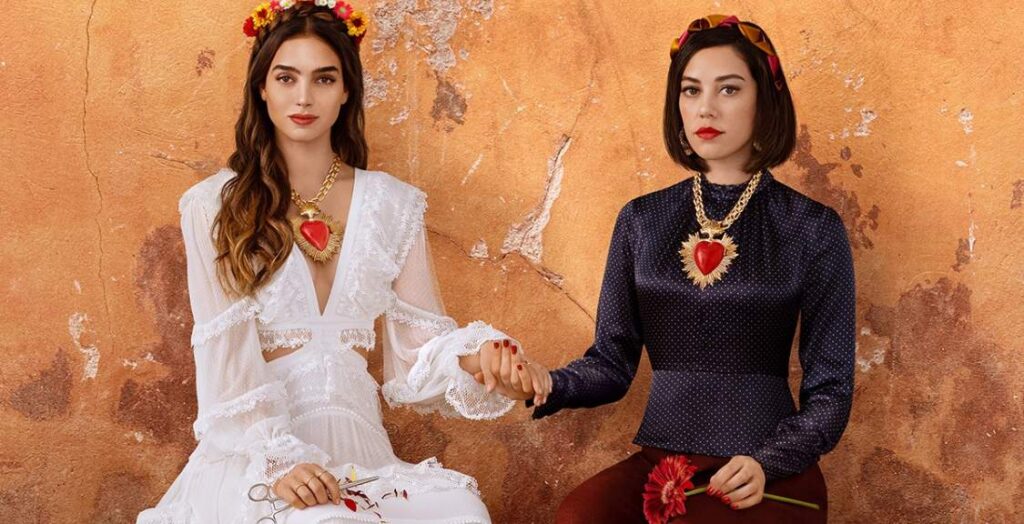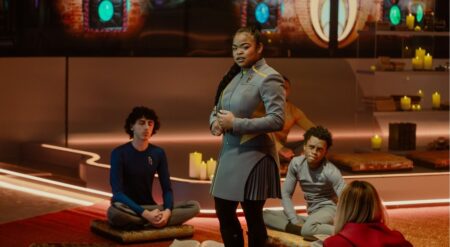Vida, a STARZ original series from creator-writer Tanya Saracho, has entered its third and final season. If you haven’t heard about this groundbreaking series before, it follows Emma and Lyn Hernandez, sisters who left Boyle Heights only to return after their mother’s death. Over the past two seasons, Vida has been unapologetically Chicano, highlighting the life and vibrancy of our communities while also using its platform to call out issues within it. Vida Season 3 continues this.
Last season, the bar that the sisters have struggled to rebuild has finally landed on the map, which is both a great thing for the sisters and a bad for the Vigilantes, a group fighting the gentrification of the neighborhood. Additionally, each sister has grown. Emma (Mishel Prada) has relaxed, while Lyn (Melissa Barrera) has finally begun to take things seriously. Vida Season 3 picks up immediately after the end of Season 2.
The season opens with the Hernandez sisters riding the heels of success for the bar and for Emma and Lyn in their personal love lives, which for once, seem to be flourishing. That is until they discover a long-buried family secret that ruins their hard-won peace. As secrets come out, the sisters find themselves face to face with old ghosts and new enemies, all while deciding if they can continue together as a family or if they should move on alone.
Over the course of three seasons, we’ve seen Emma and Lyn grow as sisters and individuals. In Vida Season 3, Emma is trying to keep her fight while those she loves most continually disregard her trust. This season, we saw Emma at her most emotional and, specifically, her most vulnerable. Lyn is the opposite. While we’ve spent the last two seasons watching Lyn float through life, letting her impulses lead her to bring chaos, Season 3 marks a growth in the character that is amazing to watch. Season 3 is Lyn’s season. She’s focused and self-reflexive; for once, she listens to the people around her.
Additionally, Vida Season 3 is cinematic in scale. Each one of the six episodes is beautifully shot but beyond that, they each provide strong lessons for viewers and characters. From the live music happening in the bar to the music that scores each episode, Vida is beautifully and lovingly crafted. And it’s because of this that I wish that Vida wasn’t ending.
I hadn’t written about the series prior to this because of how close to me it felt. The series was one that I safeguarded and didn’t look to bring into work, but now, I feel the need to write about it. Not because it’s ending, but because of all it has done for Latino representation on screen, but more specifically, Mexican Americans on screen. Vida has showcased complex discussions of anti-Blackness in our communities, sexuality, gender norms, love, loss, how the generations speak past each other, and especially the complexities in gentrification that evolve when businesses owned by gente need to adapt or fall. Vida has moved not only me but also us as a community. And even if I don’t want it to end, these final six episodes are the best way to do it.

That said, I do wish that this season had been longer if only to allow for characters we’ve come to love, like La Pinche Chinche Mari (Chelsea Rendon), to get more time to see their paths develop. While Mari was a fixture in the first season and around in the second, I don’t feel like she got the focus that she deserved, given how she acts as the fulcrum on which the theme of gente-fiction swings. She is both a militant activist and an understanding friend.
While there are moments of her pushing back on the Vigilantes and their “mission,” these moments feel small and hollow given the lessons she’s learned by staying in the Hernandez house in Season 2. Mari’s story feels too short, too on the nose, and too clean compared to the one Emma and Lyn receive, something I believe could have been fixed if Season 3 had the length of Season 2.
But when we look at the series from the Hernandez sisters’ perspective, this ending is the only one I would have wanted. As a final season, Vida Season 3 isn’t clean. Saracho doesn’t tie up every loose end, she doesn’t drastically change characters, and the revelatory information shared is just between sisters. But that’s the point of the series, no?
Life isn’t clean, and not everything has its place, making Vida emotional and exceptional over its three seasons. Additionally, while I want more, and the characters could use another season, there is an openness to the ending of the series. The sisters will continue to live and grow and be, and somehow, even if this isn’t ideal, it is exactly how this story needs to end.
As a series, Vida reflects life in all of its messiness, never aiming to be more than a mirror for Latinx to look into and see themselves. In the series, we see both the good and the bad, but more importantly, we see how we can grow, learn, and ultimately transform ourselves. While I await to see what Saracho’s next projects are, Vida will always hold a place in Latinx entertainment history.
Vida Season 3 is available now on STARZ.
Vida, Season 3
-
Rating - 9/109/10
TL;DR
As a final season Vida Season 3 isn’t clean. Saracho doesn’t tie up every loose ends, she doesn’t drastically change characters, and the revelatory information shared is just between sisters. But that’s the point of the series, no? Life isn’t clean and not everything has its place and that is what has made Vida not only emotional, but exceptional over its three seasons.







